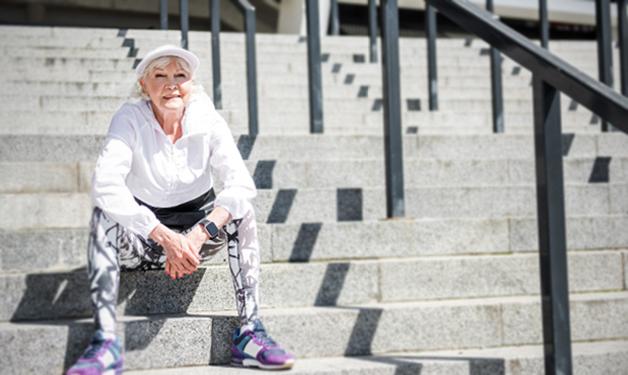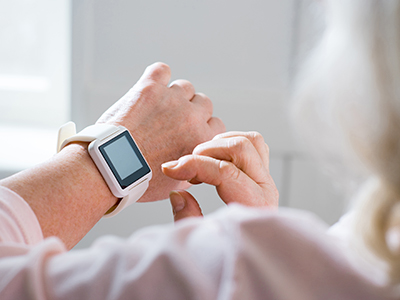
Personalizing fitness tracking technology for chronically ill patients helps boost activity levels.
Wearable fitness trackers are great motivators to meet fitness goals—but they don’t work the same for everyone. The people most in need of motivation—patients with chronic disease that can be improved with exercise—have different needs from fitness devices than healthy people. Vancouver Coastal Health Research Institute (VCHRI) research scientist Dr. Linda Li is figuring out how to reap the benefits of fitness trackers while overcoming their limitations. She tested the Fitbit wearable with a variety of arthritis patients and conducted focus groups on their experience.
“We’ve found these devices are really designed for healthy, younger people. They don’t take into account the needs of older patients with chronic diseases.” Dr. Li teamed up with computer scientists at Simon Fraser University to find ways to adapt wearables for arthritis patients. They created an app called FitViz, which Dr. Li is currently testing in two clinical trials.
Dr. Li found that older patients in her focus groups were willing to use new technology but ran into obstacles like being unable to properly fasten them or unsure about how to plug them into chargers. These small things make a big difference. She also found that patients were sometimes discouraged by the devices. “Some of our participants said the wearables made them feel bad when they did not meet their activity goals. With arthritis, a painful flare up can affect people’s ability to be active. For some people, having that information fed back to you—that you’re not meeting your goals— can be distressing. It can make people give up.”

Dr. Li, however, doesn’t feel that we should give up on wearables for older patients like those with osteoarthritis. Being physically active reduces pain and fatigue, improves mobility and enhances the quality of life in people with arthritis. But only 13 per cent of arthritis patients are getting the amount of exercise they should be. Dr. Li’s recent studies prove that wearable trackers, when properly designed and supported, are a powerful tool to boost patient activity rates.
“Being able to track your progress is very motivating. People really do respond to the ‘rewards’—the congratulations— that the device offers when they meet their goals. The key is to set realistic goals.”
The human touch
Dr. Li and her team have determined that wearables work best when paired with professional help to set realistic goals. “You can’t just hand patients wearables and say off you go.” In her recent studies, Dr. Li provided counselling to patients on how to set realistic goals that match their condition. Patients were paired with a physiotherapist and both logged in to the Fitbit dashboard to check on the patient’s progress. The physiotherapist followed up by phone with the patient to discuss any challenges they were encountering, provide suggestions, and counsel them to adjust their goals over time. Fitness outcomes improved.

“People want to know about themselves over time and see trends compared to a month or year ago. It’s very powerful.”
Dr. Li is now working with VCHRI research scientist Dr. Diane Lacaille and patient partners to design an even more comprehensive tracking app that will allow patients to input much more information such as pain levels each day, mood, and the type of activity they did. “The patient can record pain, fatigue level, treatment, and display the information side-by-side with their Fitbit data to better understand how what they do affects how they feel.”
Dr. Li says being in control is hugely beneficial for sustainable long-term disease management. “It’s very empowering for patients. They are far more likely to keep up with a fitness program if they plan it, try it, and make it themselves.”
Dr. Li is actively recruiting participants for her wearable tracker studies. One is with osteoarthritis, the other with inflammatory arthritis.


